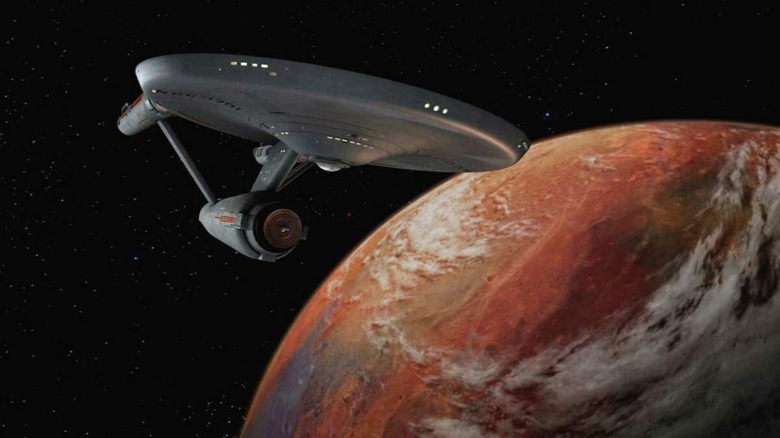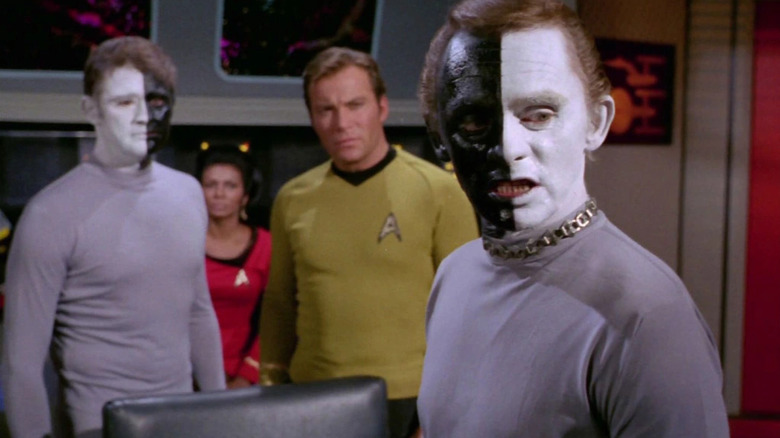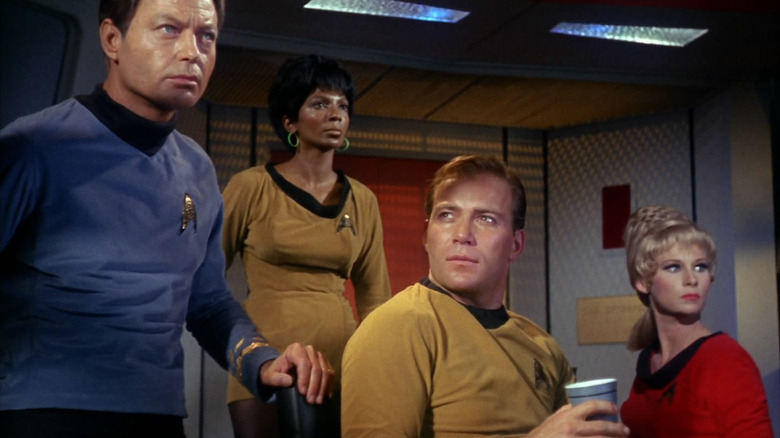Gene Roddenberry Originally Pitched Star Trek To Studios As A 'Space Western'
As a genre, science fiction can be — and has often been — wielded to address politics, topics, and philosophies that might be difficult to get people to engage in without a fantastical coating. A hard-hitting drama about racism as it appears on Earth, for instance, requires an assertive voice and an artist with a distinct point of view. In sci-fi, however, racism can appear on an alien world in the distant future. If two species of aliens hate one another, and racism is comfortably couched in metaphor, it gives the (very human) audiences an opportunity to view hatred and bigotry from an outside point of view. Analysis is then encouraged.
The "sci-fi metaphor" approach to politics was always a major factor in Gene Roddenberry's 1966 TV series "Star Trek," a show set several hundred years in the future when humanity had ostensibly outlived its capacity for war and prejudice. Sexism still remained — Roddenberry was notoriously horny — but for the most part, "Star Trek" has come to be accepted as a utopian future. Money is gone, humanity is unified, and people now traverse the heavens in technological marvels, meeting alien civilizations and spreading peace. It was a show that venerated pacifism and preached multiculturalism. Roddenberry also did away with religion, giving people less of a reason to fight among themselves.
There was, however, a twinge of retrogressive politics in "Star Trek" that remains embedded in the franchise to this day: The concept of Manifest Destiny is exciting. It calls space "the final frontier," evoking images of European cowboys traversing the Old West. Indeed, according to the book, "The Fifty-Year Mission: The Complete, Uncensored, Unauthorized Oral History of Star Trek: The First 25 Years," Roddenberry initially sold "Star Trek" as a Western.
'Wagon Train' to the stars
It has famously been proliferated that Gene Roddenberry pitched "Star Trek" to CBS as "'Wagon Train' to the stars." "Wagon Train" was a 1957 Western that ran for 284 episodes, ending its successful run in 1965. It was about the titular caravan traversing the American West, traveling from Missouri to California. Westerns were big business on TV in the 1950s and through the 1960s, so it stands to reason that Roddenberry would evoke them when pitching a sci-fi story. "Star Trek: The Original Series" is about a group of explorers trekking in a specialized vehicle into a new unknown frontier, they are armed with pistols, and there are dangerous hostiles lurking somewhere. There was also a recent war that the explorers are still smarting from. One can see the myriad parallels right away.
Roddenberry was a veteran of World War II and a former Los Angeles police officer, and it seems he had seen his fill of conflict, violence, and hatred. Rather than be jaded by it, though, he thought of a multiracial, pacifist future beyond hate, war, and shootouts.
Roddenberry himself said in "The Fifty-Year Mission":
"I was tired of writing for shows where there was always a shoot-out in the last act and somebody was killed. 'Star Trek' was formulated to change that. I had been a freelance writer for about a dozen years and was chafing at the commercial censorship on television. You really couldn't talk about anything you cared to talk about. It seemed to me that perhaps if I wanted to talk about sex, religion, politics, make some comments against Vietnam, and so on, that if I had similar situations involving these subjects happening on other planets to little green people, indeed it might get by. And it did."
The frontier
Lurking within, though, was a sense that humanity was leading the charge into a frontier to spread their philosophy among the unexpected. It's easy to see the parallel between "Star Trek" and stories of white men "conquering" the West. Despite everything, "Star Trek" still possesses colonialist underpinnings. Those underpinnings have, of course, been addressed multiple times in the franchise's decades-long history, but complaints usually come from embittered aliens who resent the Federation's peaceful life and efficiency at reallocating resources and eliminating want. "Star Trek" also attempted to undo any notions of Manifest Destiny by introducing an in-lore plot conceit called the Prime Directive.
By the Prime Directive, no starship is allowed to interfere in the natural development of an alien civilization. If a world is about to go to war or engages in immoral acts like slavery or torture, Starfleet is not allowed to interfere. Societies must make their worst mistakes on their own time. Humanity is not galavanting around the galaxy, imposing its will on others. The Prime Directive is an anti-colonialist notion. "Star Trek" worked very hard to shake off its relationship to Westerns and to Manifest Destiny.
But, because it was pitched as a Western and created by a TV writer who had previously worked on shows like "Have Gun Will Travel," a lot of those "we deserve to explore this land" ideas floated in.
Because of the sci-fi metaphor, however, it's a lot easier to accept. The cosmos are infinite and mysterious and, as far as we know, no one actually lives there. Exploring up in the stars seems healthier and more exhilarating than any old Western.


